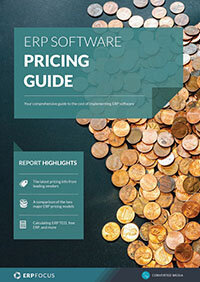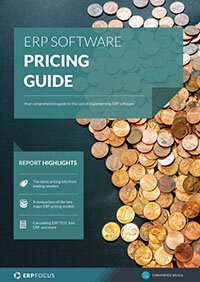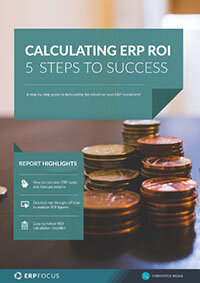How much does ERP cost? (Free ERP cost and budget guide)
Asking how much ERP costs is akin to asking the length of a piece of string so it’s no wonder buyers can so easily get their heads into a spin. Setting a budget for a new ERP requires careful planning and a thorough understanding of your business needs.
But, first, let's answer the question everyone's asking...
How much does ERP software cost?
An ERP report showed that the average budget per user is $9,000. Considering the number of users and additional expenses, an ERP implementation can range between $150,000 and $750,000 for a mid-sized business.
To create a more accurate budget, consider your business's specific requirements. This guide will walk you through the steps to setting a budget tailored to your organization and provide insights into the average ERP system cost.
Quick jump to:
1. Components of an ERP budget
3. Choosing an ERP pricing model that suits your business
4. Selecting ERP features your business needs
5. Calculating ERP implementation and installation cost
1. Components of an ERP budget
Even with approval to invest in a new ERP system, you need to create a detailed budget and justify the cost of ERP implementation. Key aspects to consider include:
- Software licensing fees
- Additional servers and network hardware
- Data conversion and transfer to new ERP
- Customization if necessary
- Testing
- Training
- Vendor/consultancy support post-implementation
These are the most tangible costs to include in your budget but you also need to think ahead to budgetary banana skins and make room for contingencies. We will go into the hidden costs a little further on.
2. Justifying the cost of new ERP software
Improved business intelligence, speeding up the order-to-cash cycle, and increased productivity - these are just a few reasons businesses invest in ERP systems. However, you’ll need to justify the ERP price with a solid ROI projection to secure funding.
A business may want a new ERP system for various reasons, such as boosting productivity, enhancing business intelligence from improved data capture and analysis, speeding up the order-to-cash cycle, and cutting labor costs. However, with other units also needing budget allocations, ensure the expense is justified both now and in the future.
One effective way to do this is by quantifying expected returns through an ERP ROI report. This will help align ERP benefits with financial expectations, ensuring stakeholders see the value.
Use this guide to calculating ERP ROI to put a figure on your investment
Focus on selecting the right pricing model and ERP features that will deliver the most value. Not every business will need all available modules, so choose those that will maximize your ROI.
3. Choosing an ERP pricing model
There are two readily accepted pricing models for ERP purchase, systems, each with unique benefits and drawbacks that will affect your ERP price:
The perpetual licensing model (aka on-premise systems)
This model involves hosting the ERP software on your servers. For larger businesses, this can be cost-effective, but the upfront costs for infrastructure can be significant for smaller businesses.
Advantages
- Well-defined cost of ownership
- Allows permanent use of license without ongoing subscription costs
- May offer lower total cost of ownership (TCO) for larger businesses over time
Disadvantages
- Upfront costs for onsite infrastructure can be prohibitive for medium and small businesses
- Can be expensive to scale as a business grows due to the need for further infrastructure upgrades
The SaaS subscription model (aka cloud-based systems)
SaaS ERP systems are popular with smaller businesses due to their lower initial investment. This model is cloud-hosted, eliminating the need for extensive hardware. However, ongoing subscription fees can add up.
Advantages:
- Subscription pricing can be based on user numbers or transaction volumes to give greater flexibility and scalability
- Lower upfront costs due to lack of necessity for on-premise hardware extension
- Lower initial outlay for license
Disadvantages:
- Ongoing subscription costs could outweigh the costs of Perpetual License for larger businesses that could have utilized existing infrastructure on-premise
- Sudden spikes in demand can increase costs under any on-demand license agreement, making cost management more complex over time
Choosing between these models will depend on your current infrastructure and your projected ERP implementation cost. A hybrid model might also be an option.
4. Deciding which ERP features you need
One of the biggest pitfalls in any tech investment is the potential to be oversold. While accounting, financial management, and inventory management are essential for most businesses, not every company needs a CRM module or a B2C commerce interface. To calculate the right ERP budget and invest wisely, choose only the features that you need.
There could also be features that you don’t need today but might need in the near future. For example, you might not need multi-currency or multilingual capabilities in your financial module right now, but if you are soon to be launching in new markets, it could be cheaper to include these features from the outset rather than having to retrofit later.
5. Calculating ERP installation costs
Installation costs for ERP systems vary widely based on factors like infrastructure readiness and customization. For on-premise solutions, auditing your current systems is crucial to understand the full cost of ERP implementation.
Forecasting for hidden costs
The most common hidden, underestimated or just plain forgotten costs of ERP implementation are staff training, unanticipated customization, and data conversion. You can mitigate many of the ‘hidden costs’ by anticipating the extra work, training, and features that your new ERP requires. However, there are often costs that come along later, after implementation, that you need to make provisions for.
Sometimes, despite the best planning, you may find that you need to re-engineer some of your internal processes; this can take time and resources that you had not planned for. If this won't work, then you may need to go back to your vendor for customization that you didn’t originally budget for.
This, in turn, can mean retraining too, meaning more time and more resources you hadn’t planned for. However, there are often hidden bonuses to implementation that will counteract the costs, and having around a 10% contingency budget built into your ROI projections will stand you in good stead for any unforeseen expenditure.
6. Creating your ERP budget
Now that you have given some thought to what you expect from your ERP, what you do and do not need and which pricing model might be the best fit for your business, it is time to start getting in the quotes. Vendors and consultants can guide you and you can make comparisons accordingly.
To compare out-of-box prices from different vendors, take a look at our ERP software pricing guide
Use the vendor quotes to help hone your budget forecast but always be mindful of future costs, agility and ensuring you choose the features that will deliver a tangible benefit to your organization.
Forecasting your ROI
After much deliberation over budgets and costs, it is equally important to project expected returns. Assigning value to your ERP implementation means going back to the original reasons you started the project. Reporting on cost-savings resulting from your ERP may even extend beyond those original objectives. Key areas to assess include:
- Labor cost reductions: did you actually eliminate excess resources or simply allow them more thumb-twiddling time?
- Improved cash-to-order cycle: have you seen the improvements you projected when you first set out?
- Supply chain management: have inventory and quality control measures become more efficient?
This guide should give you the starting blocks you need to create a comprehensive ERP budget for your project, as well as a good way to estimate your total ERP cost.
Free white paper

ERP Software Pricing Guide
Get the latest pricing information on over 80 popular ERP systems, and learn how to budget for your ERP project in our free guide

Featured white papers
-

Calculating ERP ROI: 5 steps to success
Calculate your new ERP's financial benefits with this comprehensive guide
Download
Related articles
-

A complete ERP RFP template & guide (includes free template)
All you need to know construct a foolproof ERP RFP, including a customizable template
-

CMMC Compliance: What Aerospace and Defense Manufacturers Need to Know
Key insights on CMMC compliance, deadlines, and securing DoD contracts with CMMC 2.0 certificatio...
-

Top 10 ERP selection criteria (including checklist)
The most important ERP selection criteria you should keep in mind during your selection process.

